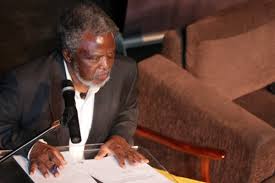Described as an intellectual giant, Professor Muxe Nkondo, the former vice-chancellor of the University of Venda, South Africa, was laid to rest on 23 August in Pretoria after a funeral service at Freedom Park, the heritage site for heroes of the struggle against apartheid.
Nkondo was 83 when he passed away on 18 August at his home in Pretoria.
He was at the helm of the University of Venda from 1994 to 2005.
A fierce transformation advocate, Nkondo championed historically disadvantaged institutions, arguing for better resources and pushing for curriculum reform.
“How will universities play a part in producing the new person the ANC spoke about at its congress when we don’t have a new curriculum? The old South Africa’s values remain strong in our system,” he said in an interview with the author in 2000.
Nkondo led black vice-chancellors in their call for redress to bring their institutions on a par with former white institutions. Among the many descriptions of the academic with the genial smile was that he was radical, loved dancing and devoted time to his family.
Tribute from President Ramaphosa
Following his death, tributes came from far and wide, including a message of sympathy from South African President Cyril Ramaphosa, who said the death of the eminent scholar, academic, social policy and heritage expert saddened him.
Nkondo was a former vice-chancellor of the University of Venda and deputy vice-chancellor of the University of the North, both in South Africa’s Limpopo province, and a Harvard Andrew Mellon Fellow in English.
The president said Nkondo’s life was characterised by a relentless pursuit of knowledge, which made his country, continent and the world richer and more inclusive.
“His ideas and their application have impacted lives and institutions across the globe. They also have a diaspora of academics, leaders and administrators who have benefited from Professor Nkondo’s inexhaustible intellect and interest in improving humanity,” Ramaphosa said.
Delivering the eulogy at his funeral, Deputy President Paul Mashatile reminded mourners that Nkondo was a well-known name in local politics, Southern Africa and the continent.
As an academic, Nkondo produced great intellectuals, academics, ministers and public servants who serve the country with distinction today.
Thanks to the wisdom of Nkondo “we can proudly say we are Africans, and ours is to build a nation that is a non-racial, non-sexist, democratic, united and prosperous society,” he said.
Mashatile said Nkondo’s legacy should inspire future generations to continue the struggle for a more just and equitable society.
A leading figure in higher education
The late academic’s wife, Professor Olga Nkondo, joined the tributes to her late husband, describing him as a man who loved his family. She said he encouraged her to pursue her academic ambitions and supported her.
Science, Technology and Innovation Minister Dr Blade Nzimande described Nkondo as a friend, colleague and fellow intellectual in the struggle against apartheid.
He added that Nkondo has a special place in the history of the struggles leading up to the fall of apartheid and the emergence of democracy in the early 1990s.
“I remember him as a radical scholar, organic intellectual, activist, and a leading figure among the first generation of vice-chancellors who led our higher education system through its difficult first decades of transformation,” said Nzimande.
He said Nkondo had placed great importance on recognising African liberation as a process of overcoming the legacies of political disempowerment and one of cultural, social, economic and intellectual emancipation.
“It is hard to pigeonhole the intellectual contribution of Professor Nkondo, as he was truly a polymath whose contributions spanned a stunning range of areas, including science and technology, higher education, arts and culture, public administration, human settlements, tourism, and rural development.”
University of Venda Vice-Chancellor Professor Bernard Nthambeleni said Nkondo had served the university with dedication and passion, leaving a lasting impact on the lives of many within the community.
“During his tenure, Nkondo championed academic excellence, innovation and inclusivity, shaping our university into what it is today,” he added.
In a statement, the South African Democratic Teachers Union (SADTU) said Nkondo embodied a teacher it envisioned as a union.
SADTU has a special relationship with the Nkondo family through the late Curtis Nkondo, his brother, who was the first vice president of SADTU at its launch in 1990.
“Just like his brother, he understood the value of education beyond pedagogy but as a tool which one could use to beat the apartheid system. He had a passion, not only for education, but also for arts, environment and helping communities,” the statement said.
Professor Muxe Nkondo, who was laid to rest at Rebecca Cemetery in Tshwane, is survived by his wife, Olga; and his children, Ntsako, Muxe, Mikateko, Zava, Mbonya, and Nkenyezi; grandchildren; and a great-grandchild.
University World News














